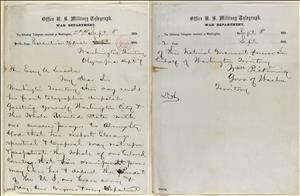On September 8, 1864, Governor William Pickering (1798-1873) sends the first official telegram from Washington Territory. The telegraph line from south of the Columbia River has just reached Olympia. Pickering is eager to announce that the territory is now in contact with the rest of the United States, and sends a telegram to that effect to his old friend, President Abraham Lincoln.
Telegraph Poles March Across the Country
Commercial telegraph lines were established between Washington, D.C., and Baltimore, Maryland, in 1843 and 1844. By the mid-1850s, many small telegraph companies had sprung up along the East Coast. These were consolidated and reduced to about six major companies by 1861. Meanwhile on the West Coast, local telegraph lines were built between several California cities. The federal government saw the need for a transcontinental telegraph line, which would require heavy funding. "On June 16, 1860, President James Buchanan signed 'An Act to Facilitate Communication between the Atlantic and Pacific States by Electric Telegraph,' also known as the Pacific Telegraph Act" ("The Transcontinental Telegraph"). Work began in the summer of 1861 and was completed when crews from the east and from the west converged on Salt Lake City that fall.
President Abraham Lincoln received the first true transcontinental telegram from Stephen J. Field, Chief Justice of the California Supreme Court, on October 24, 1861. From that time on, the telegraph revolutionized contact between distant points, "enabling transcontinental communication in a fraction of the time required by the Pony Express and stagecoach mail services" ("The Transcontinental Telegraph"). But while transcontinental communication had been achieved, most far-flung Western towns were not located on the telegraph routes and still had to rely on other modes of transportation to carry news. A telegraph line northward from California finally reached Portland, Oregon, in March 1864. Crews continued building the line north into Washington Territory.
Olympia’s First Outgoing Telegram
On September 8, 1864, the line reached Olympia. Governor William Pickering’s first outgoing telegram, received at Washington, D.C., at 2 p.m., September 8, 1864, read:
"His Excy A Lincoln
"My Dear Sir
"Washington Territory this day sends her first telegraphic dispatch greeting yourself Washington City & the whole United States with our sincere prayers to Almighty God that his richest blessings spiritual & temporal may rest upon & perpetuate the whole of our beloved country, that his omnipresent power may bless her & defend the President of the US, our brave army & navy, and Congress & every Department of the National Government forever. In behalf of Washington Territory
"Wm Pickering
"Govr of Washn Territory” (Abraham Lincoln papers).
Lincoln’s response, which was sent the same day, read:
"Office U.S. Military Telegraph,
"War Department,
"Washington, D.C., Sept. 8, 1864.
"Gov. Pickering
"Olympia, W.T.
"Your patriotic dispatch of yesterday received, and will be published.
"A. Lincoln” (The Collected Works ...).
Other Telegraphic Messages
On October 25, 1864, the telegraph line reached Seattle. The first communications to the city contained news of the Civil War, which were promptly published in the Seattle Gazette. War news continued to be heavily represented in telegraphic dispatches. When President Lincoln died on April 15, 1865, the news was wired to all states and territories. The text of the telegram was reprinted in Olympia’s Washington Democrat newspaper.
Pickering had been a close friend of Lincoln’s, having served as a Whig in the Illinois House of Representatives from 1842 to 1852. Pickering later joined the Republican Party, and "served as chairman of the Illinois delegation to the Republican National Convention, playing a pivotal role in getting Lincoln’s name into nomination. In 1862 Lincoln offered Pickering a choice of a diplomatic post in Great Britain or the governorship of the Washington Territory. Pickering chose the latter" ("Pickering, William"). He served as governor from 1862 to 1866.
During his gubernatorial term, in addition to overseeing the arrival of the transcontinental telegraph, Pickering reconfigured the territorial government, improved territorial roads, advocated for a decent road across the Cascade Mountains, and secured funding for care for mental patients. He gave his first address to the Washington Territorial Legislature on December 17, 1862, where he opposed the existing practice of granting legislative divorces. He gave his last address on December 11, 1866; during this message, he again emphasized the need of a highway across the Cascades.
Pickering returned to Albion, Illinois, in 1867. He died in Edwards County, Illinois, on April 22, 1873.

